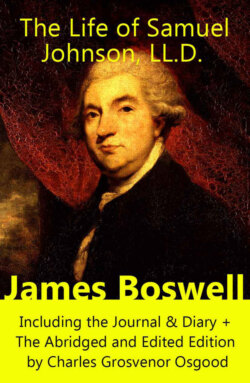Читать книгу The Life of Samuel Johnson, LL.D. - James Boswell - Страница 30
На сайте Литреса книга снята с продажи.
S.J.
Оглавление[Page 115: Reports of the Debates. Ætat 29.]
[Page 116: Libels in the press. A.D. 1738.]
It appears that he was now enlisted by Mr. Cave as a regular coadjutor in his magazine, by which he probably obtained a tolerable livelihood. At what time, or by what means, he had acquired a competent knowledge both of French[332] and Italian[333], I do not know; but he was so well skilled in them, as to be sufficiently qualified for a translator. That part of his labour which consisted in emendation and improvement of the productions of other contributors, like that employed in levelling ground, can be perceived only by those who had an opportunity of comparing the original with the altered copy. What we certainly know to have been done by him in this way, was the Debates in both houses of Parliament, under the name of ‘The Senate of Lilliput,’ sometimes with feigned denominations of the several speakers, sometimes with denominations formed of the letters of their real names, in the manner of what is called anagram, so that they might easily be decyphered. Parliament then kept the press in a kind of mysterious awe, which made it necessary to have recourse to such devices. In our time it has acquired an unrestrained freedom, so that the people in all parts of the kingdom have a fair, open, and exact report of the actual proceedings of their representatives and legislators, which in our constitution is highly to be valued; though, unquestionably, there has of late been too much reason to complain of the petulance with which obscure scribblers have presumed to treat men of the most respectable character and situation[334].
[Page 117: William Guthrie. Ætat 29.]
This important article of the Gentleman’s Magazine was, for several years, executed by Mr. William Guthrie, a man who deserves to be respectably recorded in the literary annals of this country. He was descended of an ancient family in Scotland; but having a small patrimony, and being an adherent of the unfortunate house of Stuart, he could not accept of any office in the state; he therefore came to London, and employed his talents and learning as an ‘Authour by profession[335].’ His writings in history, criticism, and politicks, had considerable merit[336]. He was the first English historian who had recourse to that authentick source of information, the Parliamentary Journals; and such was the power of his political pen, that, at an early period, Government thought it worth their while to keep it quiet by a pension, which he enjoyed till his death. Johnson esteemed him enough to wish that his life should be written[337]. The debates in Parliament, which were brought home and digested by Guthrie, whose memory, though surpassed by others who have since followed him in the same department, was yet very quick and tenacious, were sent by Cave to Johnson for his revision[338]; and, after some time, when Guthrie had attained to greater variety of employment, and the speeches were more and more enriched by the accession of Johnson’s genius, it was resolved that he should do the whole himself, from the scanty notes furnished by persons employed to attend in both houses of Parliament. Sometimes, however, as he himself told me, he had nothing more communicated to him than the names of the several speakers, and the part which they had taken in the debate[339].
[Page 118: London, a Poem. A.D. 1738.]
Thus was Johnson employed during some of the best years of his life, as a mere literary labourer ‘for gain, not glory[340],’ solely to obtain an honest support. He however indulged himself in occasional little sallies, which the French so happily express by the term jeux d’esprit, and which will be noticed in their order, in the progress of this work.
[Page 119: Oldham and Johnson compared. Ætat 29.]
But what first displayed his transcendent powers, and ‘gave the world assurance of the MAN[341],’ was his London, a Poem, in Imitation of the Third Satire of Juvenal: which came out in May this year, and burst forth with a splendour, the rays of which will for ever encircle his name. Boileau had imitated the same satire with great success, applying it to Paris; but an attentive comparison will satisfy every reader, that he is much excelled by the English Juvenal. Oldham had also imitated it, and applied it to London; all which performances concur to prove, that great cities, in every age, and in every country, will furnish similar topicks of satire[342]. Whether Johnson had previously read Oldham’s imitation, I do not know; but it is not a little remarkable, that there is scarcely any coincidence found between the two performances, though upon the very same subject. The only instances are, in describing London as the sink of foreign worthlessness:
‘——the common shore, Where France does all her filth and ordure pour.’
